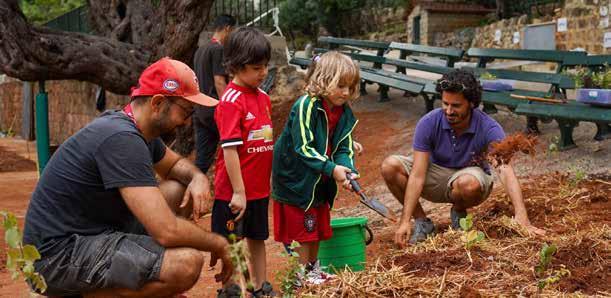
12 minute read
Inside IC Fall 2023
Enviromental Sustainability
Preschool (Ras Beirut )
International College emphasizes the importance of nature-based experiences for young learners. This is evident through the preschool’s newly unveiled experiential learning playgrounds. Developed in collaboration with “The OtherDada”, renowned for innovative design, the playgrounds are dynamic learning spaces fostering cognitive, social, and emotional development. Beyond physical activity, the spaces encourage research, critical thinking, and literacy skills. The naturecentric design promotes environmental stewardship, offering interactive green classrooms where our youngest learners can explore, question, wonder, observe, and collect data. Children are prompted to inquire about various plants and creatures, instilling a profound love for nature and establishing a foundational understanding of their role as environmentally responsible citizens. This year’s students have already enjoyed partaking in planting these spaces and bringing them to
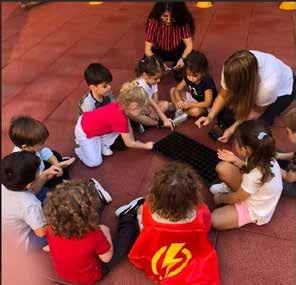
life with their little hands. They will continue to tend to and care for the seeds and small plants, enhancing their understanding of concepts such as environmental sustainability and responsibility.
Elementary schools (Ras Beirut & Ain Aar)
Sustaining Natural Resources - CM1 / Grade 4
As part of their unit of inquiry “Sharing the Planet”, CM1 and Grade 4 students inquired on how the use of natural resources entails social and environmental consequences. They welcomed Mrs. Rita Hajj, Head of IC’s Sustainability Program, who walked them through the different types of natural resources and their importance in satisfying human needs. They also explored the negative impacts of human activities on these resources (quarrying, deforestation, pollution, water waste...), and recognized their responsibility in the sustainable use and management of these resources.
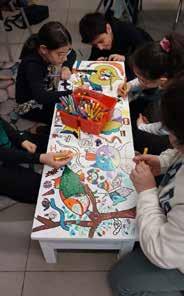
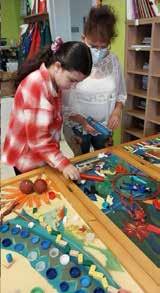
By the end of the unit, it was clear for our CM1/Grade 4 learners in Ras Beirut that upcycling and recycling are important ways of reusing resources. Our caring students decided to take action and created sustainable upcycled objects such as stools and benches out of unused discarded items. This was just a start for our global citizens in taking care of our planet! Students will make their creations available for use within the school premises.
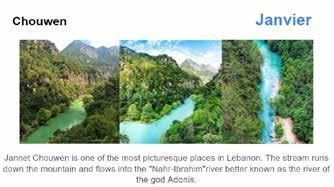
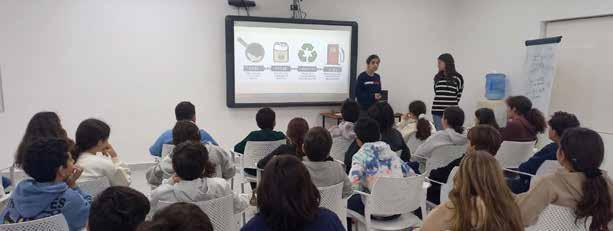
From Used Cooking Oil to Biofuel - CM2 / Grade 5
As part of their unit of inquiry “Sharing the Planet”, our grade 5/CM2 students on both Ras Beirut and Ain Aar campuses, inquired into the different forms of energy sources, the transfer and transformation of energy and sustainable energy practices. Our caring learners then decided to take an action to demonstrate their understanding of how energy may be converted, transformed and used to support human needs. They attended a fascinating learning session with guest speakers, Lea Hatoum and Yasmine Chaaytani from the “Zeit w Saboon” team (IC’s secondary school), where they explored the significance of renewable energy sources, specifically bioenergy. They discovered a remarkable fact: Used Cooking Oil (UCO), which is very harmful to our environment, can actually be transformed into biofuel! Repurposing UCO for biofuel production can help mitigate its negative environmental impacts on land and water. Particularly, using it for aviation fuel is a step towards sustainability. After this intervention, our learners decided to implement a UCO collection

campaign throughout the different levels of their elementary school. Students will be collecting UCO in sealed plastic bottles. The collected UCO will be donated to a Lebanese company (Poil), that will purify it to produce biofuel.
Middle schools (Ras Beirut & Ain Aar)
Save the Forest - 6ème/Grade 6 - Ain Aar
Interdisciplinary projects offer the opportunity for our students to enhance the interconnectedness of the different disciplines they are learning by addressing one theme from different perspectives through answering a real-life problem thus making learning more authentic. This trimester witnessed the implementation of our 6ème/Grade 6 interdisciplinary project “Save the Forest”.
The project’s objective is for students to understand the importance of natural ecosystems, mainly forests, for people’s health and well-being. In social studies, our learners selected Chnaniir Nature Reserve as the target forest as part of their unit related to the five themes of geography. In sciences, students explored concepts related to ecosystems’ goods and services, ecosystems’ dynamics, and the importance of ecosystems’ conservation. In English, 6ème students read the novel “Save the Forest”, in which they understood the vital need for forests’ conservation. Students of Grade 6 on the other hand, worked in English on interpreting information presented in a digital comic format to raise awareness about the negative impacts of deforestation. In Arabic, students read and interpreted the novel “موــي راجشلأا تفتخا”.
Throughout the intervention, our students recognized the importance of forest ecosystem conservation in Lebanon and understood their role as future leaders in alleviating the negative human impacts on natural ecosystems. After this awareness session, our learners reflected on the different learnings acquired throughout the different disciplines and were given the voice and choice to come up with “actions” to save this forest!
Students chose to:
• Produce bottles of concentrated iced myrtle tea and donate them to the Chnaniir Nature Reserve to support it in sustainable income generation. The region of Chnaniir is known for its richness in myrtle trees.
• Create and donate customized bookmarks for Chnaniir Nature reserve, with drawings of the map of Chnaniir and geographical information about the forest on the back of the bookmark.
• Create, print and give the nature reserve copies of a treasure hunt game revolving around Chnaniir nature reserve.
• Create a memory card game about the nature reserve.
• Create an instagram page to further promote the nature reserve.
Stay tuned to learn more about their initiatives!
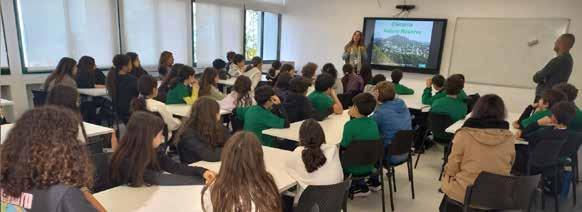
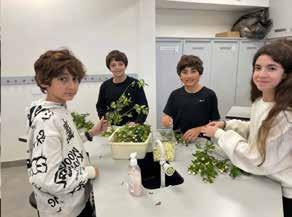
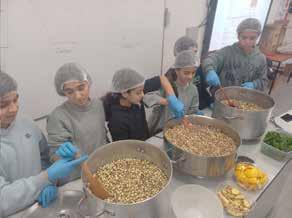
From Myrtle to ICe Tea ! - 6ème - Ain Aar
As part of their science curriculum, our 6ème students in Ain Aar inquired into the techniques of food conservation. After learning that the region of Chnaniir is renowned for its richness in myrtle trees, they decided to conserve the myrtle fruits by producing concentrated myrtle iced tea. They welcomed Mr. Alain Chehab, a specialist in food production, to learn the scientific concepts underlying ice tea production as well as the production techniques and steps. Later, our learners picked 17.5 kg of myrtle fruits originating
from Chnaniir and transformed them into iced tea with three different flavors (original myrtle ice tea, orange-ginger-myrtle ice tea and mint-myrtle ice tea). Around 120 bottles were produced! Click here to enjoy a sneak peak of the students’ journey throughout the project. The next step is for our students to brand their product and donate it to the Chnaniir Nature Reserve as an action to Save the Forest! Stay tuned to see the final branded product that could be the beginning of a new student-made IC brand!
Seed-Bombing the Campus! - 6ème - Ras Beirut
As part of their biology unit revolving around ecosystems’ conservation, 6ème students in Ras Beirut explored the importance of natural ecosystems to people’s health and well-being. They understood the concepts of ecosystems’ goods and services, ecosystems’ dynamics, and the importance of ecosystems’ conservation. To crown their knowledge, they decided to take action by planting seed-bombs within the campus to improve its biodiversity and contribute to the creation of a diversified ecosystem.
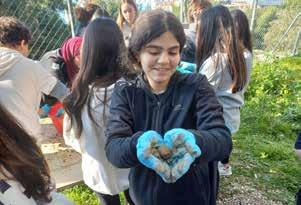

“Projet climat” - 5ème - Ras Beirut
As part of their science program, 5ème learners in Ras Beirut implemented a project titled “Le climat dans le futur”. Students explored the causes and effects of climate changes on humans and the environment and the ways to mitigate its impacts. They welcomed Ms. Lea Kaii, head of the climate change department at the Ministry of the Environment in Lebanon. Ms. Kaii addressed the causes and consequences of climate change in Lebanon and our country’s commitment to the UNFCCC (United Nations Framework to Combat Climate Change). Her intervention coincided with the COP27 that took place in Egypt from November 6 to 18.
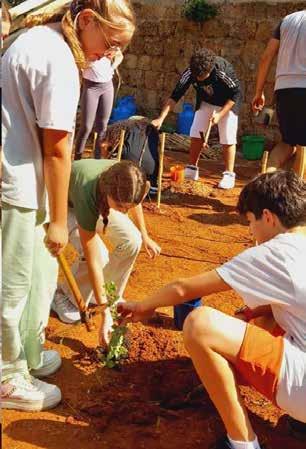
By the end of their research, it was clear for our 5ème learners that reducing pollution and contributing to reforestation efforts were two solutions to counteract climate change. As global citizen leaders, our caring students decided to take action by planting native trees in the Preschool’s newly created Miyawaki forest, in order to mitigate the impacts of climate change.

Symbiotic Relationships and PermacultureGrade 7 - Ain Aar
As part of Grade 7’s science unit revolving around symbiotic relationships, students explored how interactions between different species contribute to permaculture, and how companion planting, used in permaculture, helps promote biodiversity and preserve the environment.
Students inquired into ways to be environmentally responsible, and found a strong link between their learnings about symbiotic relationships and permaculture. The concept of permaculture strongly stresses on the importance of optimizing the choice of plants and of conserving the soil’s characteristics in order to grow sustainable crops in an environmentally responsible way. The sciences unit related to symbiotic relationships
highlighted the importance of these relationships to the environment, mainly in permaculture. The 5E model was applied (Engage, Explore, Explain, Elaborate, Evaluate). Students were engaged through a series of activities and games (ID card game, virtual garden creation, etc.) that enabled them to understand how permaculture fields depend on these relations to sustain themselves.
Students will now invest their knowledge as part of their coming interdisciplinary project “Grade 7’s Secret Garden” to create a sustainable ecosystem within the school’s premises. Students will suggest different scenarios and implement a “secret garden” planted with the most adapted species.
Sustaining the School’s Ecosystems - Grade 7 - Ras Beirut
As part of their biology course, grade 7 learners dived into the world of flowering plants and explored plant structures for reproduction. They inquired into the characteristics of plants, the differences between vascular and nonvascular plants, angiosperms and gymnosperms, the reproduction patterns of the different plant types and the steps
of a plant’s growth. After this unit, our students recognized the importance of plants in sustaining the environment and therefore, contributed to the plantation of pine and oak seedlings in the newly created Miyawaki forest within the Ras Beirut campus.

In Search for a Sustainable Ending - Gr9 LB - Ras Beirut
As part of their English curriculum, grade 9 LB students read “The pearl”. At the end of this novella, Kino’s hopes and dreams are destroyed when his sick son Coyotito is killed. During the story, the father finds a precious Pearl inspiring desire and envy in everyone who hears of it. He finds out that this pearl caused many more problems than it solved (greed, violence, envy…), and ends up throwing it back into the ocean. This story sensitizes the students about the dangers of greed and symbolizes the destructive nature of materialism. However, what would happen if Kino had a sustainable solution available to him to treat his son?
After reading the novel, students attended a session with Mrs. Rita Hajj, Head of IC’s Sustainability Program, who talked to them about sustainable development and its three main pillars (economic, social, and environmental), as well as the roles of NGOs in creating sustainable communities. Following this session, students
were divided into groups, and each group created a “virtual” NGO (with its mission, vision, values, objectives and activities) and rewrote the ending of the novel with a sustainable solution in mind. The “virtual” NGOs aimed to help Kino find a sustainable solution to treat Coyotito instead of him depending on a pearl. Every group rewrote the ending of the novella in which Kino implements a sustainable income generating activity in collaboration with the created NGO and Coyotito does not die.
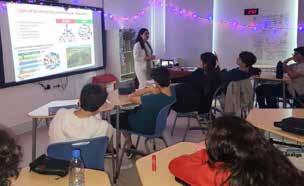
Éco-délégués (Ain Aar)
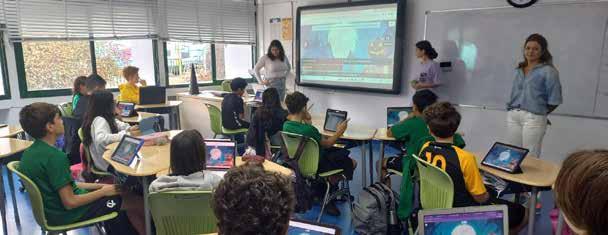
Protecting Migratory Birds
On the occasion of the International Day of Migratory Birds, Ain Aar Middle School’s “écodélégués” (eco-representatives) organized an awareness campaign about the importance of migratory birds in Lebanon and our responsibility in protecting them, to their peers and teachers. 6ème / Grade 6 students and Middle school
teachers engaged in a series of eye-opening activities, thoroughly created by the éco-délégués (kahoot games, presentations, interactions, Google forms, etc.), that highlighted the role of everyone in contributing to the protection of migratory birds in Lebanon.

International Mountain Day
On the occasion of the international mountain day celebrated on December 11th, Ain Aar Middle School’s “éco-délégués” organized an event at the second recess on Tuesday December 12th. Under the shiny sun of the Mullah football court, our éco-délégués installed stands and organized a series of games, carefully conceived and created by them. Students from grade 6 to grade 9 (English and French streams) enjoyed crafts, tailored board games, mountain litter fishing, question pour un champion, quarry rehabilitation challenge, mountain origami and many other games. All students got together and celebrated this international day with the aim of uniting in the protection of our mountains.
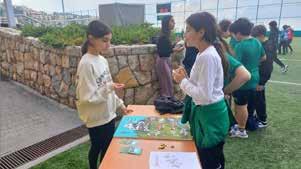
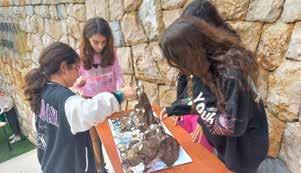
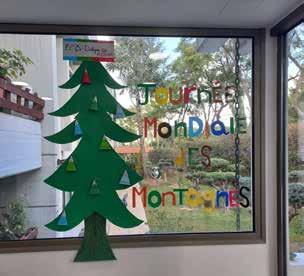
In parallel, our éco-délégués decorated the entrance of Ain Aar’s Gate C with Christmas trees decorated with student-made mountain origamis. Students learned and wrote the names of the different Lebanese mountains on the origamis to raise the community’s awareness about our country’s richness in mountain ecosystems.


